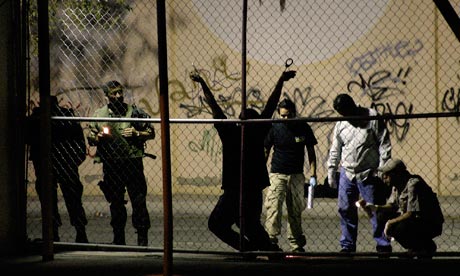 As we mentioned on Monday, there has been an increased push behind rethinking Mexico’s counternarcotics strategy. Legalization of certain drugs was one suggestion backed by former Mexican president Vicente Fox “as a strategy to weaken and break the economic system that allows cartels to earn huge profits". In the face of increased pressure to produce better results current president Felipe Calderon has been forced to admit that his policies may need to be modified.
As we mentioned on Monday, there has been an increased push behind rethinking Mexico’s counternarcotics strategy. Legalization of certain drugs was one suggestion backed by former Mexican president Vicente Fox “as a strategy to weaken and break the economic system that allows cartels to earn huge profits". In the face of increased pressure to produce better results current president Felipe Calderon has been forced to admit that his policies may need to be modified."I know that the strategy has been questioned, and my administration is more than willing to revise, strengthen or change it if needed," admitted Calderon after one of a series of meetings designed to seek solutions to Mexico’s drug problems. He admitted that his government as working on a plan to combat money laundering and agreed with the need to provide more social opportunities to youth. Yet he also defended his overall strategy against violent cartels and was skeptical of drug legalization.
At a meeting with judicial officials on Wednesday, Calderon got on the offensive and questioned the apparent lack of prosecution against suspects accused of violent crimes. “There are a large number of people who are detained in police actions, caught in the act or in the company of other criminal suspects, and notwithstanding that, the number of people who are finally brought to trial or convicted is significantly less,” mentioned Calderon.
Since Calderon took office nearly four years ago an estimated 28,000 people have been killed in Mexico. Despite an anti-drug strategy that includes millions of dollars in U.S. aid the Mexican government is seemingly overwhelmed by the strength of the gangs:
Scarcely a decade after Mexico took a giant step toward genuine multiparty democracy, traffickers now may pose a long-term danger to its stability. Rising chaos "requires us to change our view of the problem, that it is no longer a matter of organized crime but rather of the loss of the state," the leading newspaper El Universal said in an editorial in June.Image- The Guardian (“Military and forensic experts inspect the body of a man killed outside a nightclub in the Mexican border city of Ciudad” Juarez.)
Online Sources- The Guardian, The Latin Americanist, AP, New York Times, Seattle Times, Reuters
No comments:
Post a Comment